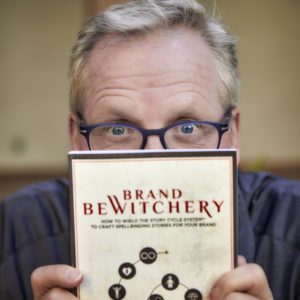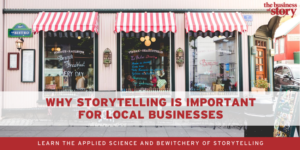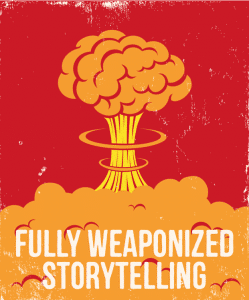Content marketing can generate interest, while compelling brand story marketing will fascinate your customers and move them to action
Yesterday, on a blistering Phoenix afternoon, I escaped into the dark confines of the FilmBar on 2nd street in Roosevelt Row. This is Phoenix’s true indie cinema. Think of it as kitschy/hipster lounge meets 1947 movie theater.
I watched the film music documentary, Score. I was excited because I have always wanted to work in the film scoring world as a producer. In fact, that’s probably my only professional regret: that I didn’t have the guts to go for it. My first trip to L.A. from the Pacific Northwest after I graduated with a degree in music composition and theory from WAZZU scared the bejesus out of me. That place was nuts!
So yep, I was all in on this flick. Especially given its description:
This documentary brings Hollywood’s premier composers together to give viewers a privileged look inside the musical challenges and creative secrecy of the world’s most widely known music genre: the film score.
But I left unfulfilled. For all that Score has going for it, with the myriad legendary composers it features, including Hans Zimmer, John Williams and Trent Reznor, and the iconic movies and scores it explores, the film sadly has feeble story composition.
It’s an interesting film, but not fascinating. And it’s probably only interesting to the “already aroused;” those like me who have a background in music composition or an appreciation for the craft.
I lifted the “already aroused” line from my friend Dr. Randy Olson’s response to my text this morning about my frustration with the movie. Olson is an author, filmmaker and proselytizer of the And, But & Therefore story structure.
“Production documentaries, I think, are meant for the already aroused. The filmmakers wouldn’t really understand what is meant by story if they had it explained to them in detail,” he wrote.
Score’s narrative is built on an “And, And, And” structure, which elicits a Blah, Blah, Blah reaction in the viewer unless you are deeply interested in the subject. It takes the moviegoer academically through the scoring process without diving into the human journey that composers go through to create these marvelous works.
They’re telling about data instead of showing drama
You learn that these artists have tremendous self-doubts, even the greatest among them. And that writing soundtracks is often a solitary pursuit. And that experimenting with sonic expressions is important. And that there are a number of different sound stages from Abbie Road in London to Fox Studios in Hollywood that provide unique sound qualities. And that music scores will move you… And, And, And.
BUT, there are few anecdotes in the movie about the human drama of creating these epic productions. The documentary only touches on many fascinating stories that are intriguing but then devolves into a litany of staccato facts and stats about film scoring…
“Music has tremendous driving power within the narrative of any film.” –Leonard Maltin
“The score is the heart and beat of the film.” –James Cameron
“So much of it is felt; it’s all about intuition.” –Rachel Portman
Yes, I think most people know this. So tell us a story based on a moment of despair, inspiration, epiphany, joy or sorrow that a composer experiences as they create these marvelous works. That’s what I was hoping Score explored: the human dynamic.
A story finally appears in the mix
Then, at the very end of the movie, tucked in the data detritus of the credits roll, the movie shares the most powerful moment of this documentary.
James Cameron, the director of Titanic, appears in a little box and tells a captivating story about the film’s composer, the late James Horner. In fact, push play below and listen to the actual recording Cameron heard as you read the rest of this post. It’ll be the soundtrack to your learning how this haunting tune came to life.
Cameron had received a tape from Horner of this piano track with the word “Sketch” written on it. No other instructions came with the tape. He figured it must be the song for the “Drawing” scene when Jack sketches Rose in the nude.
So he pulled up the scene, cued a particular swell in the music to a poignant moment where Jack looks up from his drawing at Rose, and then pressed play.
He got goosebumps.
Cameron tells of jumping on the phone with Horner extolling how perfectly the music worked. Horner sounded surprised but pleased. He told Cameron that he knew of a gifted pianist who would be perfect to record the song, but Cameron pushed back. He wanted to use this recording.
Horner said it was just him poorly playing a demo track for Cameron to consider, and that it could be much better for the movie.
Cameron said, “No, this is perfect.” He liked the humanity that came through the player’s imperfections, which made the scene all the more powerful.
Here’s how it all came together.
Are your stories interesting or fascinating?
This experience had an impact on me because, although I enjoyed the movie, it did not fascinate me. Cameron’s story did. The storytellers suffer from the curse of the expert. They selected interviews that shared general information and occasionally dove into a human interest story only to just as quickly duck out of it.
Don’t bury your stories. Celebrate them in the opening of your content. Stand for something. Make an argument. And then pay it off throughout your narrative.
Don’t just strive for being interesting. Fascinate.

If you want more ways to fascinate, listen to my interview with Sally Hogshead who famously said, “Different is better than better.”
Is your story marketing focused on fascinating your audiences? Or is it simply of interest to the already aroused? Listicles, infographics, “How to’s” and other generalized data-centric content are what bombard us all daily. They presume we’re already aroused about the subject matter, even though we’re probably not.
If you truly want to connect with your customers, share the human impact of your offering through a true story well told.
That’s how you get their heart to go on.











